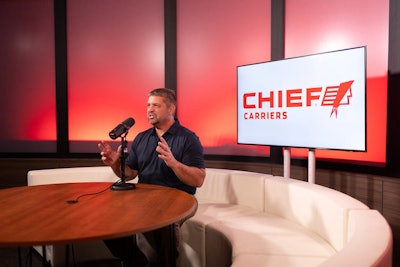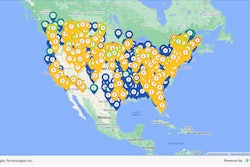
GP Transco (CCJ Top 250, No. 175), an Illinois-based carrier with over 500 trucks, recently rolled out a new fuel incentive program that compensates drivers who drive efficiently and save fuel. But the program didn’t take off until the company addressed it on its new podcast: Voice GP Transco. After being featured on the internal podcast hosted by company executives, the program skyrocketed from about 30% to nearly 90% participation.
The company uses the podcast, published monthly to a private YouTube channel, to communicate internal information to its drivers and all other employees so the entire team – from fleet managers to mechanics – is on the same page, said Sergey Bort, GP Transco’s vice president of marketing and strategy.
“As we continued to grow as a company, it became evident that keeping all of our drivers on the same page regarding company policies, the reasons for those policies, changes, updates and additions is very challenging,” Bort said. “We wanted a way to reach our drivers and thought about sending out surveys for them to submit questions and answer them in an email format, but we quickly remembered that these days no one reads, so we thought that responding to their concerns and questions and addressing company policies in a video format would mean a much higher viewership compared to text, and we were right.”
About 90% of GP Transco drivers watch or listen to the podcast. Bort said that in the short time the company has been using the medium, it has received great feedback from drivers – who are able to submit questions they want answered on the podcast – primarily because they appreciate hearing from the top brass.
“According to our drivers, other companies they worked for had leadership that was invisible to the drivers, which does not feel very inclusive to them,” Bort said. “Having the executive team speak directly and exclusively to the drivers gives our drivers a sense of belonging, a sense that they have a say in what goes on at the headquarters and shows them that we are transparent as a company.”
 GP Transco executives take part in the company's recently launched Voice GP Transco video podcast.GP Transco
GP Transco executives take part in the company's recently launched Voice GP Transco video podcast.GP Transco
FirstFleet (No. 49), a Tennessee-based carrier with over 3,500 employees across 140 cities, also publishes a podcast featuring its top executives – and sometimes human resources, safety and even the drivers themselves, in addition to the occasional guest. While the FirstFleet TenFour podcast isn’t limited to employees – it’s publicly available on platforms like Spotify, and subscribers also include some FirstFleet vendors and friends in the industry – it is primarily geared toward employees, especially drivers.
The podcast was rolled out soon after the breakout of COVID-19 when there was a huge driver retention and acquisition issue facing the industry. FirstFleet felt that a significant part of that problem was tied up in communications, said FirstFleet Chief Information Officer Austin Henderson. So the company launched the monthly podcast as a way to reach their drivers in a media format they were accustomed to. Drivers have a podcast feature on the tablets they have in their trucks, and they can also scan a QR code so they can listen on their phones. The company sends out push notifications and cross posts to their social media when a new podcast is released.
“We recognize that we've got a captive audience. You've got drivers that are over the road for a living; they have lots of time without people to talk to and plenty of time to listen to content,” Henderson said. “Why don't we make use of that time and communicate company initiatives?”
The TenFour podcast focuses on content relatable to drivers.
One episode highlights nonprofit organization Truckers Against Trafficking with company executives talking about why it matters and how its consistent with the company’s core values. Another episode features an executive roundtable where they discuss the year in review – the good and the bad. Several showcase driver benefits, while others focus on fuel management and health and wellness, among other topics.
“Basically trying to focus on content that we think will provide for a better experience from a safety perspective, quality of life, health and really from corner offices down to the newest driver who came on board, providing relevant information,” Henderson said.
He said FirstFleet also uses the podcast for brand recognition and to present an image that it is a technology-forward institution.
A different approach
At Chief Carriers, the focus is shifted externally.
General Manager Andrew Winkler is a member of several trucking groups on Facebook and has witnessed some nasty comments aimed at drivers who ask genuine questions about the industry or for opinions about how they performed a task such as tying down a flatbed load. That sparked in him the desire to reach drivers across the industry – not just at his company.
The 75-truck, Nebraska-based carrier hosts a weekly podcast, called Driven Too Far: The Truth About Trucking, where Winkler discusses a wide array of topics, from the pros and cons of lease-purchase programs and finding the right carrier to work for, to the legalization of marijuana and its impact to the trucking industry.
“I wanted to use my almost 30 years of experience in transportation to help (drivers) because I was a student driver in the mid-90s,” he said. “I felt like I had a lot of knowledge to share with them, and … it might help them save some missteps along the way in their own careers. So that was kind of the idea behind it.”
Since its launch in November 2022, the podcast has accumulated close to 70 episodes and 100,000 downloads. Winkler said he wasn’t very confident that he could get many people to listen, but it has surpassed his expectations.
Though it has a decent audience count, he said the podcast has never been about reaching other drivers for the sake of recruitment. The podcast wasn’t even branded as a Chief Carriers production until about 90 days in when they placed a small “Powered by Chief” logo in the background.
But over time, Winkler said it has gotten to the point where nearly every new driver that comes in for orientation at Chief Carriers recognizes him as “the podcast guy.”
“Even though I can't say that the podcast was the reason they came, it has had an impact on our ability to recruit drivers,” he said.
Similarly, FirstFleet’s TenFour podcast can’t be credited entirely with the company’s success in retaining drivers, but it is one component in combination with adjustments to pay and benefits packages, among other things, Henderson said.
“The podcast is really just one of those pieces of the puzzle,” he said. “To the best of our ability, we need to try and meet people where they are, and I think that creates a work environment that is progressive and that allows people to interact in the methods that they prefer and enjoy … Podcasting is just another simple way for us to say, ‘We desire to be the best possible place you can work.’”










